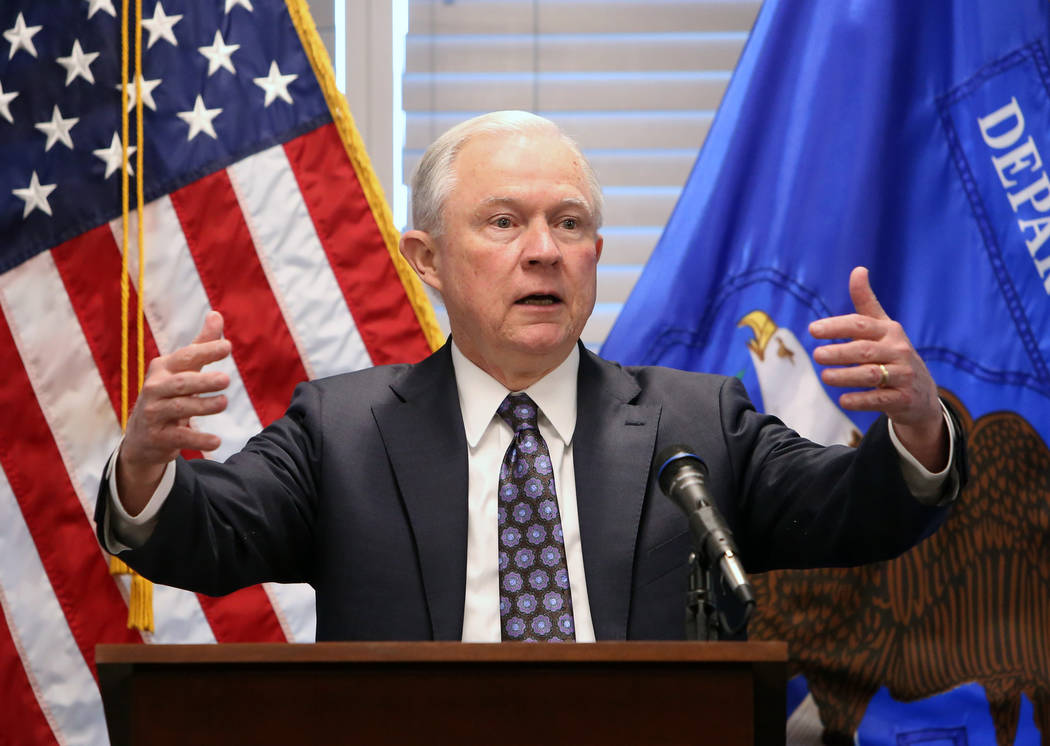Jim Hartman: Jeff Sessions admirable as attorney general
U.S. Attorney General Jeff Sessions has a real enemies list. Included on the list: the president’s son-in-law Jared Kushner, Sen. Cory Gardner of Colorado, Fox News Host Sean Hannity and conservative funders Charles and David Koch.
And that’s just some of the Republicans and conservatives. And there are others: the marijuana lobby, the Congressional Hispanic Caucus, Sen. Cory Booker of New Jersey, Gov. Jerry Brown and Sen. Kamala Harris of California. They’re Democrats and liberals.
Yet Sessions’ biggest critic in Washington has been President Donald Trump. In July 2017 Trump took to Twitter and made public comments demeaning and ridiculing the attorney general. The “twitter storm” was the result of Sessions’ announced intention to recuse himself from the investigation of the Trump campaign. But Sessions was only following “the rule of law.”
Justice Department rules dictate that no Justice official “shall participate” in an investigation “if he has a personal or political relationship with … any person or organization substantially involved … that is the subject of the investigation”.
Rudy Giuliani, of President Trump’s legal team, renewed attacks on Sessions in May 2018, calling for him to order the Mueller investigation over. Having already recused himself, Sessions could not legally order the investigation shut down.
The “rule of law” also animated Sessions’ decision to file suit against the State of California “Sanctuary State” law on immigration. Senate Bill 54 prohibits police and sheriff’s officials from cooperating with ICE agents unless they are presented with a federal warrant or criminal removal order. By largely barring the corralling of illegal immigrants upon their release from jail, SB 54 puts immigration agents and local law enforcement in danger.
The legal basis for the challenge to the California law is the 2012 Supreme Court ruling (United States v. Arizona) where the court held federal immigration laws “preempt” state laws under the Supremacy Clause of the Constitution. The Republican Arizona Legislature’s SB 1070 to “enhance” immigration enforcement was struck down as usurping the federal government’s authority to regulate immigration laws and enforcement.
Sessions has been clear again about the “rule of law” on the subject of marijuana.
Cannabis was reaffirmed in August 2016 as a federal Controlled Substances Act Schedule 1 “dangerous drug” by President Barack Obama’s Department of Health and Human Services after an exhaustive review of the relevant medical and scientific evidence. It is also “settled law” by the Supreme Court in 2005 (Gonzales v. Raich) that the federal Controlled Substances Act under the Commerce Clause preempts state laws allowing marijuana use.
With state initiatives purporting to “legalize” marijuana, the Obama administration avoided the conflict by issuing the “Cole Memorandum” promising federal law would not be enforced.
Sessions has withdrawn the Cole Memo.
“Federal law is not abrogated if a state changes its law,” Sessions says. “The attorney general is not able to withdraw federal laws. I can’t direct our people not to enforce the law and won’t do so.” Only an act of Congress can change federal law on marijuana.
Despite the controversies, Sessions has been anything but weak. At the Justice Department, he’s reversed law enforcement policy.
He replaced Obama Attorney General Eric Holder’s tough-on-police, easy-on-sentencing approach with strong support for cops and tough sentencing. Sessions regularly speaks to police and law enforcement groups.
“Sessions is almost certainly the single most effective implementer of Trump’s vision in the entire administration,” David Cole of the American Civil Liberties Union has written. Cole disagrees with those policies.
Sessions’ courage in upholding the “rule of law” in a hostile environment makes the attorney general both remarkable and admirable.
Jim Hartman is an attorney residing in Genoa, Nevada.

















